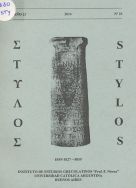La traducción de la terminología de la crítica literaria latina. Un estudio de caso: la breuitas en la Institutio Oratoria de Quintiliano
Keywords:
Translation, Technical terminology, Latin literary criticism, Breuitas, QuintilianAbstract
In the Institutio Oratoria -technical and rhetorical text intended for training of future orators-, Quintilian constantly transmits its findings and aesthetic judgments on various literary works and Greco-Latin writers. For this, the rhetor uses specialized words that belong to the field of ancient literary criticism. A detailed analysis of their appearance in the Calagurritano’s work yields the polysemic character which have many of these terms according to the circumstances of their use.
In this paper we will limit ourselves to the study of term breuitas, relieving each of their appearances and meanings along the Institutio, in order to warn the difficulties and problems that the ambiguity of this type of technical terminology presents at the time of its translation, considering the qualities of precision and strictness it requires.
Downloads
References
EDICIONES:
MARSHALL, K. (1968) A. Gelli Noctes Atticae. Vols. 1–2, Oxford, Clarendon Press.
MARX, F. (1923) M. Tulli Ciceronis Scripta Quae Manserunt Omnia. Fasc. 1: Rhetorica ad Herennium. Stutgart, Teubner.
PENACCINI, A. (2001) Quintiliano. Institutio Oratoria. Torino, Einaudi.
RACKHAM, H. (1942) Cicero in Twenty–Eight Volumes. Vol. 4: De Partitione Oratoria, London – Cambridge, Loeb.
WILKINS, A. S. (1902) M. Tulli Ciceronis Rhetorica. Vol.1: De oratore. Oxford, Clarendon Press.
ESTUDIOS CRÍTICOS:
BOLAFFI, E. (1958) La crítica filosofica e letteraria in Quintiliano. Brussels, Latomus.
CITRONI, M. (2006) “Quintilian and the perception of the system of poetic genres in the Flavian age”, en R. R. Nauta – H-J. Van Dam – J. J. L. Smolenaars (eds.) Flavian Poetry. Leiden-Boston, Brill, 1-19.
CODOÑER MERINO, C. (1990) “Terminología especializada: La crítica literaria”, Voces 1, 99-122.
DE MEO, C. (2005) Lingue tecniche del latino. Bologna, Pàtron Editore.
ECO, U. (2008) Decir casi lo mismo. Experiencias de traducción. Barcelona, Lumen.
FARRELL, J. (2010) “Literary Criticism”, en A. Barchiesi – W. Scheidel (eds.) The Oxford Handbook of Roman Studies. Oxford, Oxford University Press, 176-187.
GARCÍA YEBRA, V. (1994) Traducción: historia y teoría. Madrid, Gredos.
GARCÍA YEBRA, V. (2006) Experiencias de un traductor. Madrid, Gredos.
HATIM, B. - MASON, I. (1995) Teoría de la traducción. Una aproximación al discurso. Barcelona, Ariel.
JAKOBSON, R. (1992) “On linguistic aspects of translation”, en R. Schulte - J. Biguenet (eds.) Theories of translation. An anthology of essays from Dryden to Derrida. Chicago-London, The University of Chicago Press.
KENNEDY, G. A. (1989) (ed.) Cambridge History of Literary Criticism.Vol. I: Classical Criticism. Cambridge, Cambridge University Press.
KREBS, CH. (2008) "HEBESCERE VIRTUS" (Sall. Cat. 12.1): Metaphorical Ambiguity”, HSCPH 104, 231-236.
MARCHESE, A. - FORRANDELLAS, J. (1986) Diccionario de retórica, crítica y terminología literaria. Ariel, Barcelona.
MCDONALD, A. H. (1975) “Theme and Style in Roman Historiography”, JRS 65, 1-10.
LAUSBERG, H. (1990) Manual de retórica literaria. Madrid, Gredos.
LOBUR, J. A. (2007) “Festinatio (Haste), Brevitas (Concision), and the Generation of Imperial Ideology in Velleius Paterculus”, TAPhA 137.1, 211-230.
VARDI, A. D. (2000) “Brevity, Conciseness, and Compression in Roman Poetic Criticism and the Text of Gellius' Noctes Atticae 19.9.10”, AJPh 121.2, 291-298.
Downloads
Published
How to Cite
Issue
Section
License






